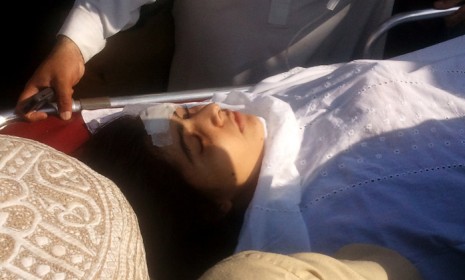A 14-year-old Pakistani girl's brave fight against the Taliban: A timeline
Young Malala Yousafzai began to rail against the Taliban's ban on girls' education when she was just 11. Just this week, she survived an assassination attempt

A free daily email with the biggest news stories of the day – and the best features from TheWeek.com
You are now subscribed
Your newsletter sign-up was successful
The international community was stunned Tuesday when a 14-year-old Pakistani girl, Malala Yousafzai, was shot in the head by Taliban militants. The teen, who has been an outspoken advocate of girls' right to education since she was 11, was ambushed on her school bus on the way home from school in the Swat Valley. Malala was flown from Mingora, the city where she lives, to Peshawar, where surgeons were able to remove a bullet near her spine. As supporters struggled to comprehend the brutal attack, many wondered why the Taliban would target a young girl. (The Taliban response: Malala has "become a symbol of Western culture in the area.") Malala's fight against oppressive Taliban strictures first began when, at age 11, she penned a diary for the BBC's Urdu service detailing the atrocities committed by the militant group. Since then, Malala has continued to speak out. Here, a look at the teen girl who took on the Taliban:
January 2009
The Taliban, hoping to enforce a ban on girls' education, orders all private schools closed in the northwestern Swat district where Malala lives. Malala subsequently writes a diary about the harrowing experience for the BBC's Urdu site. Among the more unsettling things she shares: "On my way from school to home I heard a man saying 'I will kill you'." New York Times reporter Adam Ellick then interviews Malala for the documentary Class Dismissed. At 11, she already knows that she wants to be a doctor, but cries at the thought of not being able to fulfill that dream because of the Taliban's edicts.
The Week
Escape your echo chamber. Get the facts behind the news, plus analysis from multiple perspectives.

Sign up for The Week's Free Newsletters
From our morning news briefing to a weekly Good News Newsletter, get the best of The Week delivered directly to your inbox.
From our morning news briefing to a weekly Good News Newsletter, get the best of The Week delivered directly to your inbox.
May 2009
The Taliban seizes complete control of the Swat Valley, and begins to freely patrol the city of Mingora. Dozens die and thousands flee. A peace deal between the Pakistani government and the Taliban collapses. Later, the Taliban is routed from the area, but pockets of militants remain, and they force their harsh rules on citizens.
November 2011
Malala, who has continued to speak out on behalf of all Pakistani girls, is awarded the country's first National Peace Prize for Youth, with a $10,500 award. "I convinced my friends and other classmates of the importance of education and told them that our primary education will decide our future," she says. "I am thankful not only to the students but also to their parents for honoring my requests and sending their daughters back to school."
A free daily email with the biggest news stories of the day – and the best features from TheWeek.com
December 2011
The government renames the honor the National Malala Peace Prize.
April 2012
Malala, now in the eighth grade, speaks with the website Think Twice Pakistan about a possible career in politics. "My purpose is to serve humanity, fight for their rights," she says.
Oct. 9, 2012
On her way home from school, Malala is shot in the head when Taliban gunmen pull over her school bus and ask for her by name. She is rushed to a hospital, and then later transferred to another facility in Peshawar for emergency surgery. The Taliban claims responsibility, and promises "to finish this chapter" because of Malala's ongoing "obscenity."
Oct. 10, 2012
Doctors successfully remove a bullet that was lodged near Malala's spine. Pakistan's Interior Minister Rehman Malik obtains a passport for the young girl, and the head of PIA, the national airline, offers to pay all expenses for Malala to be flown anywhere in the world for treatment should she need it.
Sources: BBC (2), CBS News, CNN, The Guardian, The New York Times, Think Twice Pakistan, The Washington Post
Frances is a senior editor at TheWeek.com, managing the website on the early morning shift and editing stories on everything from politics to entertainment to science and tech. She's a graduate of Yale and the University of Missouri journalism school, and has previously worked at TIME and Real Simple. You can follow her on Twitter and on Tumblr.
-
 Properties of the week: pretty thatched cottages
Properties of the week: pretty thatched cottagesThe Week Recommends Featuring homes in West Sussex, Dorset and Suffolk
-
 The week’s best photos
The week’s best photosIn Pictures An explosive meal, a carnival of joy, and more
-
 The ‘ravenous’ demand for Cornish minerals
The ‘ravenous’ demand for Cornish mineralsUnder the Radar Growing need for critical minerals to power tech has intensified ‘appetite’ for lithium, which could be a ‘huge boon’ for local economy